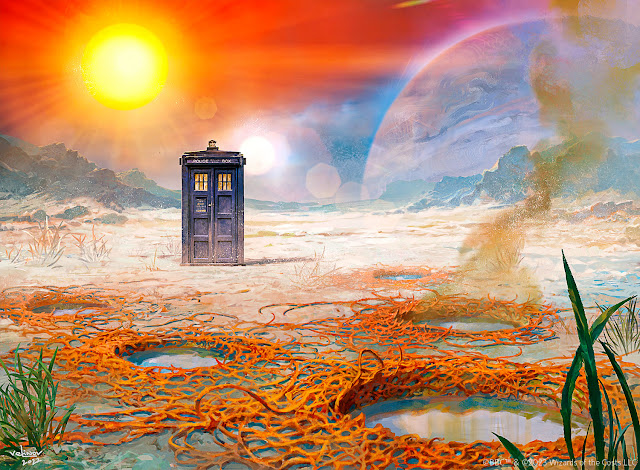Death Comes to Time [AUDIO/2001.7.13 ~ 2002.5.3]
★★★★★
I don't want to hear anything about whether Death Comes to Time is "canon" or not; it's officially licensed Dr. Who material, I'm covering it in my blog. In my mind, everything happens in the same continuity, everywhere all at once. The Dr. Who mythos is unique in that way; everything can be explained away in the most half-arsed way and it would fit with how past executive producers and showrunners have done it.
In any case, why should I not review Death Comes to Time when it's a bloody great Dr. Who adventure? It's proper space opera madness, complete with giant-scale space wars and intergalactic witch hunts of Time Lords as they stand on their last legs. The cast is star-studded down to the smallest of roles, and every main character is as interesting as the next one. Stephen Fry as the Minister of Chance in particular is a standout; that his character never got another significant role in the larger Who mythos is criminal. Sylvester McCoy gets to be the most emotionally charged he's been in years, Sophie Aldred sounds genuinely driven by the material (I mean, I don't blame her... Ace becomes a new breed of Time Lord), and John Sessions delivers an all-timer villain performance as the delightfully devilish Tannis. To call its scale 'large' would be a great understatement; I'm afraid I can't quite explain in words just how ambitious the story is, and how delightfully it goes against popularised "canon" (because, of course, writer Dan Freedman knew nothing about Dr. Who). Who cares if Time Lords are wizards? Who cares if the Doctor seemingly dies in his seventh incarnation? You can either make up a convenient and clever theory to place this snugly in the established Who timeline, or you can (like me) decide that anything is possible in Dr. Who -- because anything is possible!
I love Death Comes to Time. It's filled to the brim with ambition and imagination. It's the perfect mix between the most extravagant comicbook sensibilities and the late-1990s cinematic touch, brought together by the classically trained acting talents of BBC radio. When things get wild and the story notches up the space war sequence to 11 as classic music reaches a crescendo in the background, you realise how good Dr. Who can be. It's an instant favourite of mine, bursting at the seams with such love for the character of the Doctor. Despite claiming not to be a Who fan, Freedman gives the Doctor such empathy and sadness, like a fallen hero in a Greek tragedy making the ultimate sacrifice for just another innocent life. Epic in the true sense of the word, and filled with such melancholy and heart.





Comments
Post a Comment